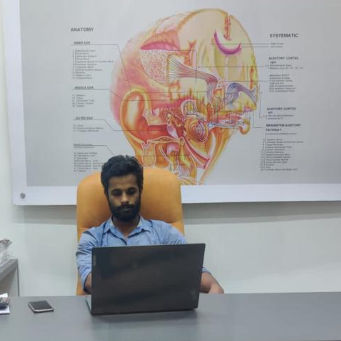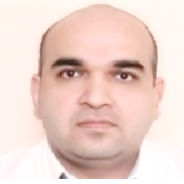Relevance
Consult Speech Therapist Online (8 doctors)

Dr. Karan
Speech Therapist
5 Years • Diploma in hearing, language and speech
Gurugram
APOLLO SUGAR CLINICS GURUGRAM, Gurugram

Miss. Anannya K Xavier
Speech Pathology and Audiology
3 Years • BACHELORS IN AUDIOLOGY& SPEECH-LANGUAGE PATHOLOGY
Bengaluru
Apollo Clinic, Sarjapur Road, Bengaluru

Dr. Ashique Rahman
Speech Therapist
9 Years • Masters in Audiology, Bachelors in Audiology & Speech Language Pathology
Gurugram
APOLLO SUGAR CLINICS GURUGRAM, Gurugram

Abhijeet
Speech Pathology and Audiology
8 Years • DHLS, Audiologist and Speech Language pathologist
Pune
Apollo Clinic, Nigdi, Pune

Mr. Himanshu Khanna
Speech Therapist
27 Years • M.Sc. Speech & Hearing
Delhi
Apollo Hospitals Indraprastha, Delhi

Ms. Ayushi Singh
Speech Therapist
2 Years • BASLP, Msc (Speech Language pathology )
Indore
Apollo Hospitals Vijay Nagar, Indore

Mr. Somenath Mukherjee. Top Speech Therapist
Speech Therapist
17 Years • B.A.S.R (Cal), M.A.S.L.P (Cal), Specially Trained in Dysphagia Management
Kolkata
Apollo Multispeciality Hospitals , Kolkata, Kolkata
(25+ Patients)

Dr. Urvashi Gupta
Speech Pathology and Audiology
7 Years • BASLP
Gautam Buddha Nagar
Apollo Cradle, Greater Noida (Childrens), Gautam Buddha Nagar
Book Consult for Speech Therapy Online
Booking an appointment with a top speech therapist is now easier than ever with Apollo 24|7. Our trusted online platform connects you with experienced speech pathologists who provide personalised care for various speech and language disorders. Whether you need a doctor for communication development, a doctor for stuttering, a doctor for treating voice disorders, a doctor for stammering or a doctor for aphasia, Apollo 24|7 has you covered. With convenient appointment slots and the option for online speech therapist consultation, you can access quality care from the comfort of your home. Don't wait any longer; book a speech therapist today and take the first step towards better communication.
What is Speech Therapy?
Speech therapy is a specialised field within healthcare that focuses on the assessment, diagnosis, and treatment of speech, language, and swallowing disorders. The primary goal of speech therapy is to help individuals improve their communication skills and overcome any barriers to effective communication. Speech therapists work with patients of all ages, from infants to the elderly, addressing a wide range of conditions such as articulation disorders, fluency disorders (e.g., stuttering), voice disorders, language delays or disorders, and swallowing difficulties. By providing individualised treatment plans and evidence-based interventions, speech therapy plays a crucial role in enhancing patients' quality of life and overall well-being.
Who is a Speech Therapist?
A speech therapist, also known as a speech pathologist, is a healthcare professional who specialises in the assessment, diagnosis, and treatment of speech, language, and swallowing disorders. In India, to become a qualified voice specialist or language therapist, one must complete a Bachelor's or Master's degree in Speech-Language Pathology from a recognised institution. Speech therapists work with patients of all ages, addressing a wide range of conditions such as articulation disorders, fluency disorders (e.g., stuttering), voice disorders, language delays or disorders, and swallowing difficulties. They play a crucial role in helping individuals improve their communication skills and prevent further complications associated with untreated speech and language disorders.
What Do Speech Therapists Do?
Speech therapists are healthcare professionals who specialise in the assessment, diagnosis, and treatment of speech, language, and swallowing disorders. Some of the key responsibilities of voice specialist and language therapist include:
Assessing and diagnosing speech, language, and swallowing disorders through various tests and evaluations
Developing individualised treatment plans to address specific communication needs, such as stuttering, aphasia, or voice disorders
Providing therapy sessions to help patients improve their articulation, fluency, voice quality, and language skills
Collaborating with other healthcare professionals, such as doctors and psychologists, to provide comprehensive care
Educating patients and their families about communication disorders and strategies for effective communication
Monitoring patient progress and adjusting treatment plans as needed to ensure optimal outcomes
What are the other Sub-Specialities of Speech Therapy?
Speech therapy encompasses several sub-specialities that focus on specific areas of communication and swallowing disorders. These include:
Language Disorders: This sub-speciality addresses difficulties in understanding or expressing language, including receptive and expressive language delays or disorders.
Speech Sound Disorders: Speech therapists specialising in this area help individuals with articulation disorders, phonological disorders, or apraxia of speech to improve their speech clarity and intelligibility.
Fluency Disorders: This sub-speciality focuses on the assessment and treatment of stuttering and other fluency disorders, helping individuals speak more smoothly and confidently.
Voice Disorders: Voice specialists address issues related to voice quality, pitch, loudness, and resonance, which may result from vocal misuse, injury, or medical conditions.
Swallowing Disorders: Also known as dysphagia, swallowing disorders are assessed and treated by speech pathologists who specialise in this area, helping individuals safely and effectively swallow food and liquids.
Cognitive-Communication Disorders: This sub-speciality addresses communication difficulties that arise from cognitive impairments, such as those resulting from traumatic brain injury, stroke, or neurodegenerative diseases.
Augmentative and Alternative Communication (AAC): Speech therapists specialising in AAC help individuals with severe communication disorders use alternative methods, such as picture boards, speech-generating devices, or sign language, to express themselves.
Paediatric Speech Therapy: This sub-speciality focuses on the unique communication needs of children, from infants to adolescents, addressing a wide range of speech, language, and swallowing disorders.
Adult Neurogenic Disorders: Speech pathologists in this area work with adults who have acquired communication disorders as a result of neurological conditions, such as stroke, traumatic brain injury, or neurodegenerative diseases.
What are the Examinations Conducted Under Speech Therapy or Tests Performed by a Speech Therapist?
Speech pathologists perform a variety of examinations and tests to assess, diagnose, and monitor speech, language, and swallowing disorders. Some of the common examinations and tests include:
Oral-Motor Assessment: This examination evaluates the strength, coordination, and range of motion of the muscles involved in speech and swallowing, such as the lips, tongue, and jaw.
Articulation Assessment: The doctor for stammering assesses an individual's ability to produce speech sounds correctly and identify any errors or difficulties in articulation.
Language Assessment: This examination evaluates an individual's receptive and expressive language skills, including vocabulary, grammar, and comprehension.
Fluency Assessment: The doctor for stuttering assesses an individual's speech fluency, identifying any instances of stuttering, prolongations, or other disruptions in the flow of speech.
Voice Evaluation: This examination assesses the quality, pitch, loudness, and resonance of an individual's voice, identifying any abnormalities or signs of vocal strain or abuse.
Swallowing Assessment: Also known as a dysphagia evaluation, this examination assesses an individual's ability to safely and effectively swallow food and liquids, identifying any signs of aspiration or swallowing difficulties.
Cognitive-Communication Assessment: A doctor for communication development evaluates an individual's cognitive-communication skills, such as attention, memory, problem-solving, and executive functioning, to identify any deficits that may impact communication.
What are the Common Conditions & Diseases That Speech Therapists Treat?
Speech pathologists treat a wide range of conditions and diseases that affect an individual's ability to communicate, swallow, and produce speech. Here are some of the most common conditions:
Articulation Disorders: Difficulties in forming certain sounds or pronouncing words correctly, such as lisps and other speech sound errors.
Fluency Disorders: Conditions like stuttering that affect the rhythm, flow, or speed of speech, including rapid or jumbled speech.
Receptive Disorders: Speech disorders where individuals struggle to understand what is being said, leading to misunderstandings or forgetting parts of conversations.
Expressive Disorders: Individuals have difficulty conveying their thoughts through speech, resulting in mixed-up parts of speech or incomplete sentences.
Aphasia: Often resulting from a stroke, aphasia can impact an individual's ability to speak, understand others, read, or write.
Child Apraxia of Speech (CAS): A developmental speech disorder characterised by difficulties in motor planning and coordination for speech production, leading to distorted or unintelligible speech.
Phonological Disorders: Patterns of sound errors where sounds are formed correctly but do not sound as they should.
Resonance Disorders: Conditions such as cleft palate that disrupt sound waves, affecting speech clarity.
Cognitive Communication Disorders: Often resulting from stroke, traumatic brain injury, or dementia, these disorders affect various aspects of communication, including verbal and nonverbal skills.
Voice Disorders: Issues with pitch, volume, or quality of the voice that may result from overuse, injury, or medical conditions.
Dysphagia: Difficulty swallowing or moving food from the mouth to the stomach safely.
Dysarthria: A motor speech disorder resulting from muscle weakness or coordination issues, causing slurred or imprecise speech.
Selective Mutism: An anxiety disorder where individuals, often children, are unable to speak in certain social situations despite having normal language skills.
Autism Spectrum Disorder (ASD): A neurodevelopmental disorder that can impact social communication and interaction skills.
Hearing Loss: Speech therapists work with individuals with hearing impairments to develop alternative communication strategies and improve speech clarity.
Reasons to See a Speech Therapist
Consulting a speech therapist is crucial for addressing various speech, language, and communication concerns. Here are some key reasons why you should visit a voice specialist or language therapist:
Struggles with Imitating Sounds: If a child or adult has difficulty imitating the sounds made by others, it may indicate a need for a doctor for stuttering or a doctor for stammering.
Decreased Variety of Sounds: If the variety of sounds made by a child decreases instead of increases, it could be a sign of a speech disorder.
Difficulty Following Commands: Struggles to follow verbal commands or respond to directions can indicate receptive language issues.
Slow Understanding of New Words: If an individual is slow to understand new words or concepts, it may suggest a need for language therapy.
Communication of Basic Needs: Difficulty in communicating basic needs or emotions can be a reason to seek speech therapy.
Changes in Communication Post-Injury or Surgery: Any changes in communication or cognition following an injury, surgery, or medical event, such as a stroke, should prompt a consultation with a doctor for communication development.
What Types of Procedures do Speech Therapists Perform?
Speech therapists perform a variety of therapeutic procedures to help individuals improve their communication and swallowing skills. Here are some of the procedures:
Articulation Therapy: Techniques such as phonetic placement therapy, minimal pair approach, and core vocabulary approach to help individuals correct sound pronunciation errors.
Language Therapy: Focuses on improving listening, grammar, vocabulary, social language, and reading skills to enhance verbal communication.
Fluency Therapy: Uses techniques like prolongation, modified airflow, and lilypad techniques to improve the flow and continuity of speech, particularly for individuals who stammer.
Oral Motor Therapy: Includes exercises such as facial massages, blowing, sucking, chewing, and biting to strengthen oral musculature and improve speech production and swallowing.
Voice Therapy: Vocal hygiene programs and exercises like resonant voice therapy, vocal function exercises, and semi-occluded vocal tract exercises to improve voice quality and loudness, are often prescribed by a voice specialist.
Auditory Verbal Therapy: Helps children with hearing impairments understand sounds and speech by following a hierarchy from sound awareness to sound comprehension.
Augmentative and Alternative Communication (AAC) Therapy: Teaches patients how to use AAC systems to communicate when verbal communication is difficult or impossible.
Swallowing Therapy: Techniques such as postural adjustments, diet modifications, and exercises to improve swallowing function and reduce the risk of aspiration.
Cognitive Communication Therapy: Strategies to improve attention, memory, problem-solving, and executive functioning skills in individuals with cognitive-communication disorders.
Social Communication Therapy: Focuses on developing social language skills, such as turn-taking, topic maintenance, and nonverbal communication.
Feeding Therapy: Addresses feeding difficulties in infants and children, including picky eating, food refusal, and transitioning to solid foods.
Apraxia of Speech Therapy: Uses techniques like sound sequencing, rhythmic cueing, and tactile cueing to improve motor planning and coordination for speech production.
Dysarthria Therapy: Focuses on improving muscle strength, coordination, and breath support to enhance speech clarity and intelligibility.
Accent Modification Therapy: Helps individuals modify their accents to improve communication in professional or social settings.
Telepractice: Delivery of speech therapy services via video conferencing or other remote technologies, allowing for greater access to care.
Why Choose an Apollo 24|7 Speech Therapist?
Apollo 24|7 speech therapists are highly qualified and experienced professionals who provide exceptional care for individuals with speech, language, and swallowing disorders. Our team of speech pathologists has specialised training in diagnosing and treating a wide range of conditions, from articulation disorders to aphasia.
At Apollo 24|7, we offer personalised care tailored to each individual's unique needs and goals. Our doctor for communication development, doctor for stuttering, doctor for treating voice disorders, doctor for aphasia and doctor for stammering works closely with patients and their families to develop comprehensive treatment plans that address their specific concerns.
With Apollo 24|7, you can book speech therapist consultations both online and in-clinic. Our online speech therapist consultation services allow you to connect with experts from the comfort of your home, while our in-clinic appointments provide hands-on assessment and treatment.
What to Expect When Visiting a Speech Therapist?
When you visit a speech therapist, you can expect a comprehensive assessment and personalised treatment plan. Here's what a typical visit may involve:
Initial Assessment: The speech therapist will review your medical history, discuss your concerns, and conduct a thorough evaluation of your speech, language, and swallowing skills. This may include observing your communication in various settings, administering standardised tests, and analysing speech samples.
Diagnosis: Based on the assessment results, the speech pathologist will provide a diagnosis and explain the nature of your speech, language, or swallowing disorder. They will discuss the potential causes and the impact on your daily life.
Treatment Planning: The voice specialist or language therapist will work with you to develop a personalised treatment plan that addresses your specific needs and goals. This may include recommendations for therapy sessions, home exercises, and strategies to improve communication or swallowing.
Therapy Sessions: During therapy sessions, the doctor for stuttering or the doctor for treating voice disorders will guide you through various exercises and activities designed to improve your speech, language, or swallowing skills. These may include articulation drills, language games, vocal exercises, or swallowing techniques.
Progress Monitoring: The doctor for communication development or the doctor for aphasia will regularly assess your progress and make adjustments to your treatment plan as needed. They will provide feedback and support to help you achieve your goals and maintain your skills over time.
How Can I Get an Appointment With a Speech Therapist?
Getting an appointment with a speech therapist at Apollo 24|7 is easy and convenient. Here's how you can book speech therapist appointments:
Online Booking: Visit the Apollo 24|7 website and navigate to the speech therapy section. ind nearby location by searching the phrase speech therapist near me, select your preferred date, and time for the appointment, and provide the necessary personal and medical information. You can also book speech therapist appointments through the Apollo 24|7 mobile application and read speech therapist reviews to find a doctor that suits your needs.
Phone Booking: Call the Apollo 24|7 helpline and speak with a representative to book a speech therapist. Provide the required details, and the representative will assist you in finding a suitable slot. You can ask them about the speech therapist fee.
Speech Therapists in top cities
Related Treatments
- •Treatment for Stammering
- •Treatment for Hearing Loss
- •Treatment for Tinnitus
- •Treatment for Child Psychology
- •Treatment for Aphasia
- •Treatment for Autism
- •Treatment for Childhood apraxia of speech
- •Treatment for Hoarseness
- •Treatment for Speech Assessment
- •Treatment for Speech Disorders
- •Treatment for Speech Language Pathology
- •Treatment for Stuttering
FAQs
What is a speech therapist?
A speech therapist, also known as a speech pathologist is a healthcare professional who specialises in assessing, diagnosing, and treating communication disorders related to speech, language, voice, fluency, and swallowing. They work with individuals of all ages to help them improve their communication skills and overcome speech-related challenges.
What are some common speech disorders that speech therapy can address?
Speech therapy can address a wide range of disorders, including articulation disorders (difficulty producing speech sounds), language disorders (difficulty understanding or using language), fluency disorders (stuttering), voice disorders (hoarseness or weakness), resonance disorders (cleft lip and palate), aphasia (loss of language following a stroke), dysarthria (motor speech disorders), and swallowing/feeding issues.
What techniques do speech therapists use during sessions?
Speech therapists use several techniques, including modelling (repeating words or sounds for practice), parallel talk (describing the child's actions), self-talk (narrating actions and thoughts), giving choices (encouraging decision-making and language development), talking slowly (aiding understanding and repetition), expansion (building on sentences to enhance language skills), positive reinforcement (encouraging progress), and visuals (using visual aids to support communication).
How do I know if my child needs to see a speech therapist?
Signs that your child may benefit from seeing a speech therapist include delayed speech development, difficulty pronouncing sounds, limited vocabulary, trouble understanding or following instructions, and frustration when trying to communicate. If you have concerns about your child's speech or language development, consult with a doctor for stammering, a doctor for stuttering or a doctor for communication development.
Can adults benefit from speech therapy?
Yes, adults can benefit from speech therapy. Adult speech therapy can help individuals who have experienced strokes, traumatic brain injuries, or neurodegenerative diseases that affect communication. It can also help adults with long-standing speech disorders, such as stuttering, or those seeking to improve their communication skills for professional or personal reasons.
What happens during a speech therapy session?
During a speech therapy session, the voice specialist or language therapist will work with the individual to address their specific communication needs. This may involve exercises to improve articulation, language skills, fluency, or voice quality. The speech therapist may also use various tools and techniques, such as picture cards, books, or augmentative and alternative communication devices, to support the individual's progress.
How long does speech therapy typically last?
The duration of speech therapy depends on the individual's specific needs and goals. Some individuals may see improvement after a few sessions, while others may require ongoing therapy for several months or even years. The speech therapist will develop a personalised treatment plan and adjust it as needed based on the individual's progress.
Can I book a speech therapist online for a consultation?
Yes, many speech therapy practices now offer online speech therapist consultations. This allows individuals to access speech therapy services from the comfort of their own homes, which can be especially beneficial for those with mobility issues or busy schedules. To find an online speech therapist, search for the phrase 'speech therapist near me' and read speech therapist reviews to find a good fit.
How can I find a speech therapist near me?
To find an online speech therapist, search for the phrase 'speech therapist near me' and ask for referrals from your primary care physician, paediatrician, or other healthcare providers. You can also search online directories or professional associations, such as the Indian Speech and Hearing Association (ISHA), for licensed speech therapists in your area. Reading speech therapist reviews and checking their qualifications can help you find a suitable provider.
How much does speech therapy cost in India?
The cost of speech therapy in India can vary depending on factors such as the location, the therapist's qualifications and experience, and the type of therapy required. On average, a speech therapy session in India can cost anywhere from Rs. 500 to Rs. 2,000 or more. Some healthcare plans may cover speech therapy, so it's worth checking with your insurance provider.